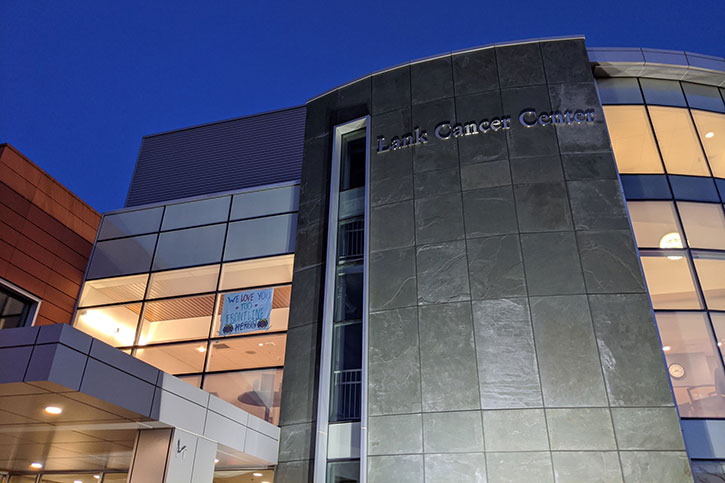Make an Appointment
To speak with a member of our gynecologic oncology team, please call.
Advanced treatments from gynecologic cancer specialists
At BID Needham, we provide comprehensive ovarian cancer care that’s focused on you. We were the first to pioneer the use of gene expression profiling (genomics) to help determine prognosis. And now we use what we learned to help predict how you will respond to chemotherapy if you have the disease.
Here, we have highly trained gynecologic oncologists, skilled nurses and other caring medical professionals. Working together, we develop a treatment plan that’s personalized for your unique needs. It may include advanced treatments, innovative clinical trials and extensive support and survivorship services. You can rely on our expertise and compassion for help getting through what can be a very difficult time.
Ovarian cancer refers to cancer that starts in a woman’s ovaries. These small reproductive glands are located on each side of the uterus. They produce eggs and hormones.
There are several different types of ovarian cancer. The type is determined by the cells from which they arise. Knowing which type of cancer you have is important because treatment for each may vary.
Ovarian tumors can occur in any age group, although they usually affect women after menopause. Epithelial tumors are the most common type occurring in adults. For that reason, the information here refers to the epithelial type of ovarian cancer.
Most women who develop ovarian cancer don’t have obvious risk factors for the disease. However, having a strong family history of ovarian and/or breast cancer is known to increase your risk. This is especially true if the relatives affected are close family members, such as your mother or sister, or if your relatives were diagnosed at a young age. Genetic testing may provide more information about your risk for developing the disease in these cases.
Factors associated with lower risk of ovarian cancer include a history of birth control pill use, pregnancy or breast feeding.
You can have ovarian cancer without having any early warning signs. In some cases, the disease is detected during a pelvic exam. However, often it spreads beyond your ovary to other areas of your pelvis or abdomen before it can be detected during this examination.
Sometimes, women report pelvic pain. However, most of those with the disease who seek medical attention do so because of abdominal discomfort and bloating. This is often the result of the tumor spreading beyond the ovary.
If your doctor discovers a mass during a pelvic exam, they may recommend other tests, such as a pelvic ultrasound. If the ultrasound confirms the possibility of an ovarian tumor, a surgical procedure is usually performed to remove the mass. Once removed, a pathologist then examines it for signs of cancer.
If cancer is confirmed, there may be several steps involved in treatment.
Surgery is performed to remove as much of the cancer as possible. This may include:
Debulking may improve the effectiveness of treatments that come after surgery, such as chemotherapy.
During the operation, your surgeon may take small amounts of tissue from many areas of your pelvis and abdomen. These tissue samples are known as biopsies. They help determine the stage of your disease and guide decisions about additional treatment.
There are four stages of ovarian cancer:
Most women are diagnosed with stage III or stage IV disease. And usually, surgery alone won’t eliminate ovarian cancer. As a result, most women with ovarian cancer get chemotherapy after surgery.
Chemotherapy may involve more than one drug. Your doctor will recommend the drugs believed to be best for your situation. Usually, chemotherapy helps destroy cancer cells that remain after surgery. Doctors use a blood test known as CA-125 to measure a substance made by ovarian cancer cells. This can tell them how well treatment is working.
Unfortunately, many (but not all) patients experience regrowth of their tumor at some point in the future. More chemotherapy may become necessary. However, control of the tumor may become more difficult. Your doctors will determine which treatments are best for you.
In some cases, doctors may recommend you participate in a clinical trial. This is a study that tests new approaches to treatment. It’s not clear if the new treatment will be better than the standard treatment, but it could be. Your health and safety remain our top priority. The decision to participate or not is completely up to you.
In most cases, we don’t know what causes ovarian cancer. Gene mutations, or abnormalities, are responsible for only about 5% of ovarian cancer cases. You can inherit a gene mutation from either parent. If you do, it increases your risk of developing cancer.
There are at least two known patterns of heredity ovarian cancer.
Most inherited cancers occur in families with breast/ovarian cancer syndrome. They’re associated with mutations in either the BRCA1 or BRCA2 genes. If a parent has one of these gene mutations, there’s a 50% chance of passing the mutation on to their children.
BRCA1 mutations account for 50–70% of inherited ovarian cancers. BRCA2 mutations are less common. They account for 15–25% of inherited ovarian cancers.
In families with Lynch syndrome II, there are usually several people who develop colon or rectal cancer, often before age 50. Unlike most colorectal cancers, these cases are usually not associated with polyps. They’re sometimes called “hereditary non-polyposis colon cancer.
These are other types of cancer that may be diagnosed in families with this syndrome:
Lynch syndrome II is caused by a mutation in one of several different genes know as mismatch repair genes. The two genes responsible for the majority of mutations are the MSH2 and MLH1 genes. Less commonly, mutations are found in the PMS1, PMS2 and MSH6 genes. In at least one-third of families with Lynch syndrome II, no identifiable mutations are found.
They don’t guarantee it, but these and other situations increase the likelihood that an inherited form of cancer may exist in your family:
Genetic testing allows us to look for gene mutations with a blood test. The test can help determine if you have an inherited form of ovarian cancer. When we find a mutation, other family members can be tested. Testing can help them learn if they’ve inherited the same mutation and have an increased risk for cancer as a result.
It’s usually best to initiate genetic testing in someone who’s already been diagnosed with cancer. Finding a specific mutation in that person makes the search for the same mutation in other family members much easier. Several types of mutations in BRCA1 and BRCA2 are more common in certain ethnic groups. Your doctor can provide you with more details if you have questions.
When you’re a woman with a mutation in BRCA1 or BRCA2, you have an increased risk of developing breast cancer and/or ovarian cancer. There are no guarantees, but there are several things you can do that may help prevent cancer or increase your chances of finding it early. Speak with your doctor about these and other steps toward prevention and early detection.
Increased cancer screenings
Mammograms, breast exams performed by your doctor and breast self-exams, may help you find breast cancer early. Pelvic ultrasound and a blood test called CA-125 may be helpful in the early detection of ovarian cancer. But it is unknown whether these surveillance measures can result in early detection that leads to improved survival if you have BRCA1 or BRCA2 mutations.
Preventive surgery
Preventive surgery is also known as prophylactic surgery. It involves removing your breasts and/or ovaries before cancer can develop. It’s important to note, however, that it’s not possible to remove all of your breast tissue. A small number of women may still develop breast cancer after surgery. Also, a type of ovarian cancer that starts inside your abdomen can develop even after your ovaries are removed.
It isn’t clear if the surgery helps you live longer. However, for some women, it is reasonable to consider preventive surgery. If you’re thinking of having the procedure, it’s important to talk with your doctor about the potential advantages and disadvantages.
Medication
The drugs tamoxifen and raloxifene have been shown to reduce a woman’s risk of developing breast cancer. But the drugs’ impact on those who carry BRCA1 and BRCA2 mutations isn’t clear. Research also has shown that taking birth control pills may lower the risk of ovarian cancer.
If you have a Lynch syndrome mutation, you’re at high risk for developing colorectal cancer. Your risk for cancer of the uterus, ovaries and stomach is increased, as well.
Having frequent colonoscopies may help detect colorectal cancer. Doctors also may use this procedure to remove precancerous growths that might become cancer. Your doctor can provide more details about colonoscopy and what you can do about your risk for other cancers.
Our cancer care team works with other specialty providers throughout BID Needham to ensure continuity of care for all your needs.


To speak with a member of our gynecologic oncology team, please call.